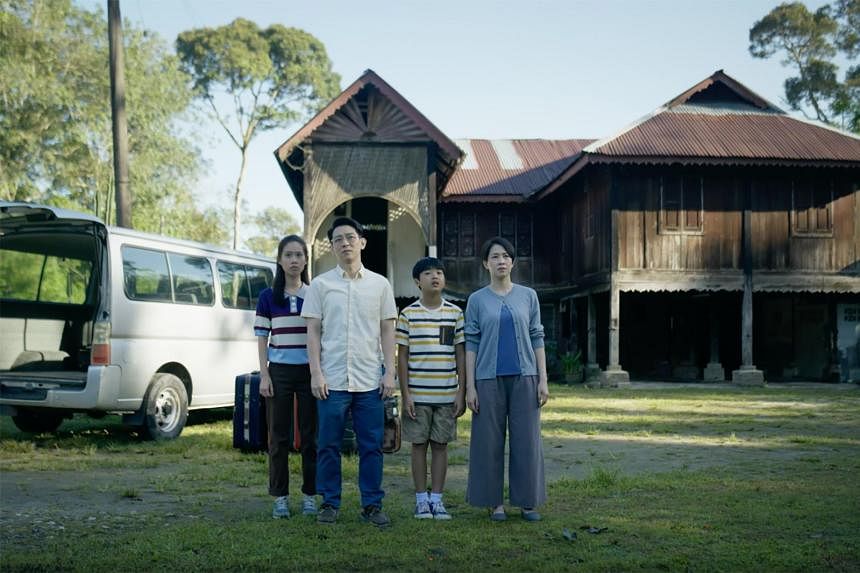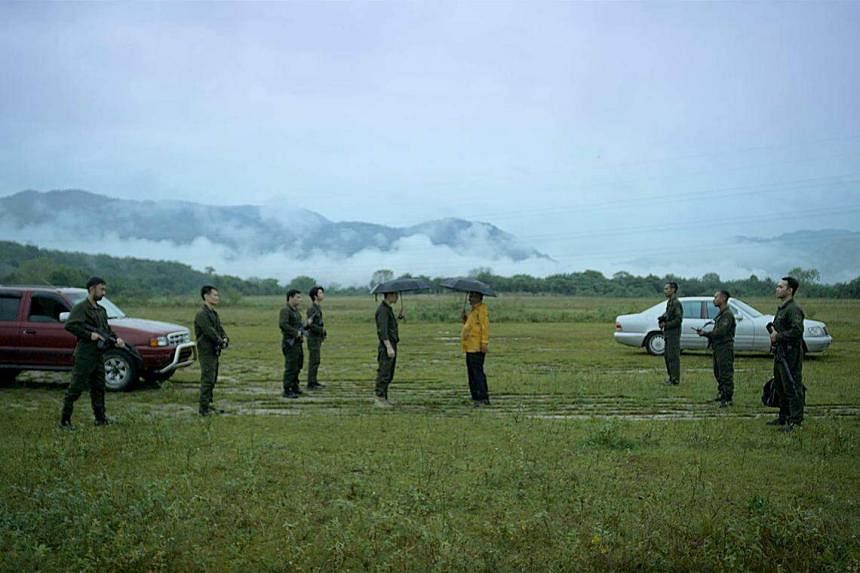
Pendatang has garnered over 879,000 views since its release on YouTube on Dec 21. PHOTO: KUMON PICTURES
Hazlin Hassan
Malaysia Correspondent
KUALA LUMPUR – The success of Malaysia’s first crowdfunded movie on YouTube could pave the way for more local film-makers to finance and release their shows online, and bypass censors in the conservative country.
Billed as a thriller where humanity triumphs over racial extremism, Pendatang has garnered over 879,000 views since its release on YouTube on Dec 21. The title means “immigrant” in Malay but is also a derogatory term used by some to distinguish the country’s minority races of largely Chinese and Indians from the Malay-Muslim majority.
Independent film company Kuman Pictures raised over RM400,000 (S$114,400) to produce the dark tale of what could happen in a dystopian Malaysia where interracial contact is banned and racial segregation leads to tensions.
Director Ng Ken Kin said that crowdfunding allowed the team to retain creative control over their production process.
“The subject matter of the script may not be comfortable for conventional investors or studios, and there’s always a possibility of them asking for changes, for whatever reasons,” Mr Ng told The Straits Times.
Asian Studies Professor James Chin from the University of Tasmania told ST that Pendatang’s success could lead to more movies being made on a crowdsourcing model.
“Pendatang has shown that it is possible if you have a big name, a good script or a very interesting story to tell. There are Malaysians willing to donate money,” he said.
Graphic designer and film-maker Desmond Hew, 42, who contributed US$1,000 (S$1,340) to Pendatang’s crowdfund, said that he did so because he knows Mr Ng, and the genre and premise of the film intrigued him.
“As a movie-goer, I am always intrigued by ‘what-if’ premises... I was curious to see how the film-makers would pull it off,” he told ST.
Producer and researcher Effa Desa, 40, said she donated because she understood how challenging it can be to make films that have non-mainstream genres or plot lines. She and her husband Johan Ong contributed over RM4,000.
“I believe that Malaysians are creative... but they receive very little support, especially when the content may be deemed ‘sensitive’. I want to see more visual stories that explore many facets of Malaysia that don’t require them to be profit-driven,” she said.
Releasing movies online also allows film-makers more leeway to explore topics that may be considered off-limits by Malaysia’s film censorship board, which must approve films before they are released via traditional channels like cinemas or TV.
“It will be good for Malaysians because there are a lot of interesting stories out there, but the way the regulations are now, it is almost impossible to deal with sensitive issues like race and religion. The more the mainstream artistic community deals with these sorts of issues, the better it is,” said Prof Chin.
However, Kuman founder and seasoned film-maker Amir Muhammad said that avoiding scrutiny from censors was not the main goal.
“I have no idea what would have been cut or not. Our main goal was to give it free to the people, as the money came from the people,” he told ST.
Mr Amir has had several of his films banned in Malaysia, including The Last Communist (2006) and its sequel, Apa Khabar Orang Kampung (Village People Radio Show, 2007).

Hazlin Hassan
Malaysia Correspondent
KUALA LUMPUR – The success of Malaysia’s first crowdfunded movie on YouTube could pave the way for more local film-makers to finance and release their shows online, and bypass censors in the conservative country.
Billed as a thriller where humanity triumphs over racial extremism, Pendatang has garnered over 879,000 views since its release on YouTube on Dec 21. The title means “immigrant” in Malay but is also a derogatory term used by some to distinguish the country’s minority races of largely Chinese and Indians from the Malay-Muslim majority.
Independent film company Kuman Pictures raised over RM400,000 (S$114,400) to produce the dark tale of what could happen in a dystopian Malaysia where interracial contact is banned and racial segregation leads to tensions.
Director Ng Ken Kin said that crowdfunding allowed the team to retain creative control over their production process.
“The subject matter of the script may not be comfortable for conventional investors or studios, and there’s always a possibility of them asking for changes, for whatever reasons,” Mr Ng told The Straits Times.
Asian Studies Professor James Chin from the University of Tasmania told ST that Pendatang’s success could lead to more movies being made on a crowdsourcing model.
“Pendatang has shown that it is possible if you have a big name, a good script or a very interesting story to tell. There are Malaysians willing to donate money,” he said.
Graphic designer and film-maker Desmond Hew, 42, who contributed US$1,000 (S$1,340) to Pendatang’s crowdfund, said that he did so because he knows Mr Ng, and the genre and premise of the film intrigued him.
“As a movie-goer, I am always intrigued by ‘what-if’ premises... I was curious to see how the film-makers would pull it off,” he told ST.
Producer and researcher Effa Desa, 40, said she donated because she understood how challenging it can be to make films that have non-mainstream genres or plot lines. She and her husband Johan Ong contributed over RM4,000.
“I believe that Malaysians are creative... but they receive very little support, especially when the content may be deemed ‘sensitive’. I want to see more visual stories that explore many facets of Malaysia that don’t require them to be profit-driven,” she said.
Releasing movies online also allows film-makers more leeway to explore topics that may be considered off-limits by Malaysia’s film censorship board, which must approve films before they are released via traditional channels like cinemas or TV.
“It will be good for Malaysians because there are a lot of interesting stories out there, but the way the regulations are now, it is almost impossible to deal with sensitive issues like race and religion. The more the mainstream artistic community deals with these sorts of issues, the better it is,” said Prof Chin.
However, Kuman founder and seasoned film-maker Amir Muhammad said that avoiding scrutiny from censors was not the main goal.
“I have no idea what would have been cut or not. Our main goal was to give it free to the people, as the money came from the people,” he told ST.
Mr Amir has had several of his films banned in Malaysia, including The Last Communist (2006) and its sequel, Apa Khabar Orang Kampung (Village People Radio Show, 2007).

The success of Malaysia’s first crowdfunded movie on YouTube, Pendatang, could pave the way for more local film-makers to finance and release their shows online
PHOTO: KUMON PICTURES
The Last Communist is a documentary that includes interviews with residents of the towns which the late Malayan Communist Party leader Chin Peng lived in, while its sequel featured exiled former communists living in southern Thailand. They were banned due to public opposition.
Race and religion are touchy topics in multicultural Malaysia, which is also conservative on issues of sex and gender.
National Film Development Corporation Malaysia chairman Kamil Othman tweeted on X on Dec 25 that Pendatang should be screened in schools “to invite discussions, and dismantle deep-seated perceptions and prejudices” but some netizens questioned if the censors would even approve it.
Among the many movies banned here include Steven Spielberg’s 1993 holocaust film, Schindler’s List, which censors described as “propaganda”. Brokeback Mountain (2005) was also banned due to its depiction of homosexuality.
More recently, local film Tiger Stripes, about a teenage girl entering puberty, made headlines when it became the first Malaysian film to win the grand prize for best feature at Cannes’ critics week in 2023. It was heavily cut when it had a brief run in Malaysian cinemas in October.
Scenes showing blood on a menstrual pad and a girl trying on her friend’s bra over her uniform in a school toilet reportedly ended up on the cutting floor.
Its director Amanda Nell Eu said on her Instagram account on Oct 20 that artists and film-makers in Malaysia “are all used to having our work and voice censored”.
“While I am not here to attack the censorship board, I am here to state that the film that will be shown in local cinemas is not the film that we made, and it is not the film that won the Grand Prize of Critics Week in Cannes,” she said.
At least two other movies have attempted to raise money through crowdfunding before, but with little success.
Malaysian actor and film-maker Bront Palarae had previously hoped to raise RM2 million in 2018 for a film based on the 1982 “dawn raid” on the London Stock Exchange by government-linked company Permodalan Nasional Berhad.
Before that, controversial film-maker Namewee sought to raise US$500,000 for his film Banglasia (2013) to recoup production costs, but only managed to collect US$186,468.
Pendatang’s success, however, could pique more interest in the local film scene.
“I look forward to more Malaysian projects being crowdfunded, whether it’s a film or an exhibition or another form of creative expression. Supporting one another in our creative endeavours is important, no matter how little we contribute,” said Ms Effa.
The Last Communist is a documentary that includes interviews with residents of the towns which the late Malayan Communist Party leader Chin Peng lived in, while its sequel featured exiled former communists living in southern Thailand. They were banned due to public opposition.
Race and religion are touchy topics in multicultural Malaysia, which is also conservative on issues of sex and gender.
National Film Development Corporation Malaysia chairman Kamil Othman tweeted on X on Dec 25 that Pendatang should be screened in schools “to invite discussions, and dismantle deep-seated perceptions and prejudices” but some netizens questioned if the censors would even approve it.
Among the many movies banned here include Steven Spielberg’s 1993 holocaust film, Schindler’s List, which censors described as “propaganda”. Brokeback Mountain (2005) was also banned due to its depiction of homosexuality.
More recently, local film Tiger Stripes, about a teenage girl entering puberty, made headlines when it became the first Malaysian film to win the grand prize for best feature at Cannes’ critics week in 2023. It was heavily cut when it had a brief run in Malaysian cinemas in October.
Scenes showing blood on a menstrual pad and a girl trying on her friend’s bra over her uniform in a school toilet reportedly ended up on the cutting floor.
Its director Amanda Nell Eu said on her Instagram account on Oct 20 that artists and film-makers in Malaysia “are all used to having our work and voice censored”.
“While I am not here to attack the censorship board, I am here to state that the film that will be shown in local cinemas is not the film that we made, and it is not the film that won the Grand Prize of Critics Week in Cannes,” she said.
At least two other movies have attempted to raise money through crowdfunding before, but with little success.
Malaysian actor and film-maker Bront Palarae had previously hoped to raise RM2 million in 2018 for a film based on the 1982 “dawn raid” on the London Stock Exchange by government-linked company Permodalan Nasional Berhad.
Before that, controversial film-maker Namewee sought to raise US$500,000 for his film Banglasia (2013) to recoup production costs, but only managed to collect US$186,468.
Pendatang’s success, however, could pique more interest in the local film scene.
“I look forward to more Malaysian projects being crowdfunded, whether it’s a film or an exhibition or another form of creative expression. Supporting one another in our creative endeavours is important, no matter how little we contribute,” said Ms Effa.
No comments:
Post a Comment